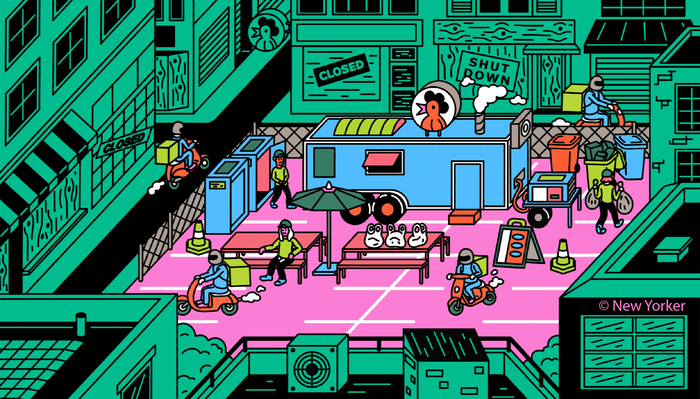Taj Hotels Hotels, Starbucks, ITC Hotels, Domino’s are finding mobile Food PODs are the best, safest and fastest format for growing through mobile outdoor dining, mobile cloud kitchens & mobile ODC!
Zomato and Swiggy may be the biggest cloud kitchen or food delivery search apps in India, but their CEOs don’t wait for 45 minutes to get unfresh food delivery. They step out for crisp air, fresh food and a happy outdoor experiences. Usually they take a short walk downstairs and join a bunch of top executives from Apple, Facebook, GSK and Vistara for a quick meal or snack at one of the Food PODs parked nearby or below their office buildings.
The experience of going to a fine-restaurant is all but over, visiting and opening a brick-and-mortar restaurant in these times of is highly-risky, expensive and fraught with losses. Whereas mobile restaurants creating memorable outdoor dining experiences where demand is waiting… and hungry – is here to stay and grow.
With restaurant-grade mobile kitchens on Food PODs becoming ghost kitchens on wheels or cloud kitchens on wheels easily, it is now the lowest-risk growth format offering a safe way for entrepreneurs to enter the business and grow. By providing a zero-shut-down franchising format to potential investors and brand owners – HungryWheels has transformed the entire landscape of F&B.
Opening a brick-and-mortar restaurant requires a gauntlet of permits and inspections; restaurateurs waiting on permits might and themselves paying months of rent for space they aren’t yet allowed to use. Hungry Wheels Food PODs are FSSAI compliant, come ready with RTO numbers and National Permits, plus they have All-India Insurance which tend sto have fewer permitting requirements.
The Food PODs form Hungry Wheels are phygital retail points on wheels themselves.
The business details are configurable: Hungry Wheels offers easy loans, with attractive rates and terms. Unlike, the brands operating Cloud Kitchens which are “virtual” and created to solely serve the aggregators demand. With Food PODs the branding and food are real, Food PODs can exist anywhere in the physical world; pop-up in your apartment parking or your factory, even come to your neighbourhood park, based on demand. Plus gets additional revenue as a Cloud Kitchen On Wheels.
Ideal for those hungry to grow while building a brand, saving opex, having zero location risk – all at the lowest investment possible. Using data from searches, HungryWheels identifies opportunities for certain cuisines in various neighbourhoods, then approaches existing brick-and-mortar restaurateurs to pitch them the idea of launching a mobile restaurant.
“Food PODs are meant to be a demand-generation tool for our restaurant partners,”
Vikram Sood.
Vikram Sood, CEO at Hungry Wheels, said. “We are partnering with hotels, QSR, cloud kitchens and restaurants to spin up hybrid mobile restaurants, to fulfill that cuisine gap. We’ll provide the high-level cuisine insight. And then we take it one step further, and provide a list of menu items within that cuisine type that are also in high demand. So we provide that granular menu-level insight.” During the pandemic, Hungry Wheels piloted a ‘Cloud Kitchen On Wheels’ initiative, in which existing restaurants used the Food PODs for delivery and take aways that were enjoyed sitting in gardens of apartmenst complexes. Brick-and-mortar restaurants, Commissary Kitchens, Central kitchens to expand their delivery footprint can operate multiple brands from a single ‘C1’ Food POD.
Chefs working in ghost or cloud kitchens are like chefs in restaurants. Invisible ghosts.
says Vikram Sood
The logic of food-delivery platforms is the logic of the digital marketplace. Just as there might be four different Amazon listings, under four different brand names, for the same USB cable, a sandwich produced in a Food POD might appear on multiple menus with different names.
Unlike a neighbourhood restaurant with a ten-year lease, Food POD brands are not necessarily angling for timelessness and longevity. There is also the opportunity for informal A/B testing: restaurant operators can change the location and update restaurant names, logos, menu items, and menu photography at their own discretion.
Like any platform, food-delivery apps have their own content-moderation problems. Many a restaurant owner has learnt only too late that her restaurant had been listed on a delivery platform without her consent, and deliveries were being made from an imposter kitchen. Such incidents pointed to a power imbalance between restaurateurs and delivery platforms, many of which list restaurants on their apps without permission or consultation.
With many closed brick-and-mortar locations in 2024, after nearly twenty years in business, and 5% profit becoming non-lucrative in static cloud kitchens many brands are planning to operate via Mobile Cloud Kitchens Food PODs. Food PODs can also work as a sort of triage effort for finding new locations for restaurants to ensure the new locations do well.
How can you benefit from the Hungry Wheels platform?
Recently, owners of an upscale North Indian restaurant chain in Bengaluru and Mumbai we spoke with, told Hungry Wheels they planned to move to a mobile-cloud-kitchen model: a central commissary kitchen will supply food to a network of twenty mobile-only kitchens, where it can be reheated and delivered. (They will continue to operate 10% of the brick-and-mortar locations as well, the locations where they own the real-estate.)

The restaurant industry in the country experimented with LOGOUT (NRAI) or off-platform methods, such as employing in-house, neighbourhood delivery runners, or fulfilling pickup orders through point-of-sale apps. Legacy and higher-end restaurants brands offered meal kits and prepackaged food – young restaurateurs don’t consider using aggregators, as in their experience this has become a highway robbery with 40% of their cheese going in commissions, one restaurateur told us. People in restaurants work so hard, and the margins are so slim. It’s an implicit class thing: blue-collar workers, but the margins are going to the software developers. “Restaurants are the new manufacturing of India, in every town and city, little factories producing food,” he said. “I believe the time for mobile cloud-kitchen Food PODs is now, they can help someone out of a job establish a brand that has no headaches and risks of the real-estate model. Restaurants are not going anywhere. What might change is how it gets to you.” Mobile Food PODs are a little surreal: the shape-shifting nature of brands and menus; the creation of the spontaneous, collective, social dimensions of dining outdoors; the merging of user experience with human labour, like a culinary alchemist.
HungryWheels – pioneering the “Fifteen-Minute City” in Asia.
In Paris, Mr. Hidalgo, ran for re-election on the platform of a “Fifteen-Minute City”: a plan for Parisians to access commerce, health-care services, education, and the workplace within a fifteen-minute stroll or bike ride from their front doors. Portland and Melbourne have pursued similar “twenty-minute neighbourhood” initiatives, which aim to allow residents to meet a range of needs within a short distance. These all represent a turn away from reliance on privately owned vehicles, and from the “Euclidean” zoning of the twentieth century, in which cities were carved up according to use, fostering sprawl and exacerbating segregation and inequality. Land-use regulations often preclude convenience: even densely populated residential neighbourhoods in urban areas can find themselves without pharmacies or grocery stores. The pandemic has intensified these inequalities, particularly for those whose access to basic resources is contingent on public transportation. Stocking up is a car owner’s game.
There is something utopian about HungryWheels’ project, which inspires visions of greener, less congested, more accessible cities, in which zero-emission fleets zip around and people congregate for cocktails in rooftop gardens, planted atop defunct parking structures or in public parks.
Mobility architect, system designer, and ecosystem builder
Since 2012, he has developed various scalable vehicle platforms and solutions for retail, logistics, and defense. As a possibilist, futurist, and innovator, Vikram’s designs have powered the success of Food POD mobile kitchens at ITC, TAJ Hotels, Qmin, Manipal Group, and more.






